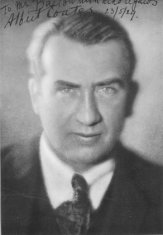Albert Coates facts for kids
Albert Coates (born April 23, 1882 – died December 11, 1953) was a famous English conductor and composer. He was born in Saint Petersburg, Russia, where his English father was a successful businessman. Albert studied music in Russia, England, and Germany. He started his career as a conductor in German opera houses.
In 1914, he became very successful in England. He conducted music by Richard Wagner at the Royal Opera House, Covent Garden. In 1919, he became the main conductor for the London Symphony Orchestra.
Albert Coates was especially good at conducting operas and Russian music. He was also known for his powerful performances of classical pieces by composers like Ludwig van Beethoven and Wolfgang Amadeus Mozart. After 1923, he often traveled to conduct in Europe and the U.S. Later in his life, he conducted in South Africa, where he passed away at age 71.
As a composer, Coates wrote seven operas. One of his operas was even performed at Covent Garden. He also wrote some pieces for orchestras.
Contents
Early Life and Musical Training
Albert Coates was born in Saint Petersburg, Russia. He was the youngest of seven sons. His father was English, and his mother was Russian.
He studied at a music school called a conservatory in Leipzig, Germany. His most important teacher there was Arthur Nikisch. After his studies, Coates worked at the opera house in Dresden. He then became a conductor at the Mariinsky Theatre in Saint Petersburg. After the Russian Revolution and World War I, he managed to leave Russia in April 1919.
A Busy Conductor in London
Albert Coates first conducted at the Royal Opera House, Covent Garden in 1914. He led a performance of Richard Wagner's opera Tristan und Isolde. Coates was full of energy and loved to introduce new music to audiences. He often performed pieces by Russian composers like Alexander Scriabin. He also championed English music by composers such as Ralph Vaughan Williams, Arnold Bax, and Gustav Holst. Coates gave the first full public performance in London of Holst's famous suite, The Planets.
In the 1920s and early 1930s, he worked a lot with the London Symphony Orchestra. He made many gramophone recordings when this technology was still new. These recordings included Scriabin's Poème de l'Extase and parts of Wagner's Der Ring des Nibelungen. In 1925, he recorded the complete Symphony No. 9 by Ludwig van Beethoven. He also conducted the very first recording of Sergei Rachmaninoff's Piano Concerto No. 3, with Vladimir Horowitz playing the piano.
In 1925, Albert Coates led the first stage performance outside Russia of Nikolai Rimsky-Korsakov's opera The Legend of the Invisible City of Kitezh and the Maiden Fevroniya.
Compositions and Later Years
Albert Coates composed several works, including operas. He also wrote a symphonic poem called The Eagle. This piece was dedicated to his former teacher, Artur Nikisch, and was performed in Leeds in 1925. In 1946, he moved to Milnerton, Cape Town, South Africa. He passed away there in 1953.
It's interesting to note that Albert Coates was not related to Eric Coates, who was another English composer known for light music. He was also not related to the singer John Coates.
Family Life
Albert Coates was married two times. In 1910, he married Ella Holland. They had one daughter named Tamara Sydonie Coates, who grew up to become a professional oboe player. Albert Coates' grandchildren include the famous violinist Elizabeth Wallfisch. His great-grandchildren include the composer Benjamin Wallfisch. Later in his life, Albert Coates married an opera singer named Vera de Villiers.
See Also
- List of composers by name
 | Georgia Louise Harris Brown |
 | Julian Abele |
 | Norma Merrick Sklarek |
 | William Sidney Pittman |


